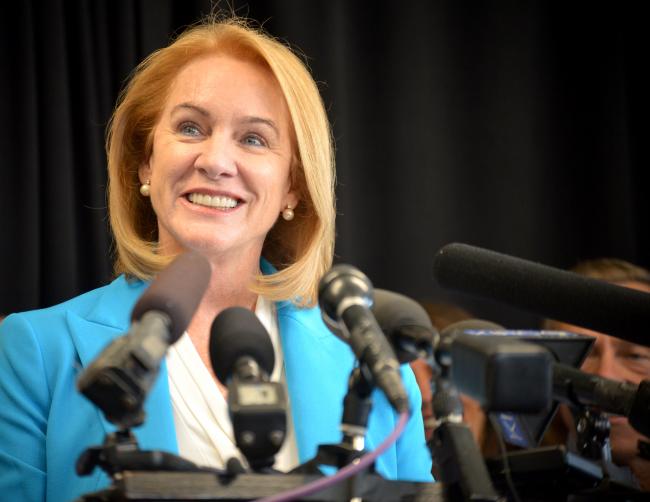OP-ED; Why Jenny Durkan is the Right Choice for Mayor of Seattle
Tue, 09/19/2017
by Gary Locke, Ron Sims, and Norm Rice
Being Mayor of Seattle is not for the faint of heart, nor is it a place for on the job training. It requires strong progressive vision, experienced leadership and the ability to bring people together to solve challenges and create positive change. It also requires someone with integrity and an unwavering commitment to justice and equality.
We speak from experience. We each have deep ties to Seattle: to its people, its challenges and its intense politics. It was a remarkable moment in our state when we served as Governor, King County Executive and Mayor of Seattle at the same time—an historic time when all three executive positions were held by people of color. We all had come through legislative bodies – and went on to serve in future positions. While we have not always agreed on every issue (and even ran against each other), today we all support Jenny Durkan for mayor of Seattle. We know she will meet the challenges facing Seattle and help lead us to a better, more equitable future.
Despite our successes, our political times were not easy. We saw our region vote to end “affirmative action” while two of us were still in office. We fought it and lost. But we kept fighting to advance justice —to protect LGBTQ rights, to find alternatives to mass incarceration, and to increase police accountability for shootings.
On each of these issues, Jenny Durkan was in the fight with us, and knew how to get results. And she continues to fight to create positive progressive change.
At the state level, she worked to help pass the LGBT non-discrimination bill, finally signed into law in 2006. Recognizing it was just one important step, over the next several years, Jenny worked with elected leaders and activists to move our state forward to recognize full marriage equality.
Jenny was with us when we faced the real outcome of the “war on drugs”—as a criminal defense attorney she saw first-hand the devastating impacts on people of color and their families. She tried to have state sentencing laws changed to offer treatment alternatives. When that failed, she strategized with then King County prosecutor Norm Maleng to create a county drug court –-one of the earliest in the nation. Thousands of people have gotten treatment, instead of jail, in the years since.
When Jenny sees a wrong, she tries to right it. After a devastating tragedy when a mentally ill attacker stabbed and killed a man leaving a Mariner’s game with his family, she worked with the victim’s family and the county to help create a mental health court that prioritizes treatment over jail.
When President Obama appointed her U.S. Attorney, she worked with the Federal Public Defender and the U.S. District Court to create one of the first-ever federal drug courts to battle addiction. As a key advisor to Attorney General Eric Holder, she pushed to reform sentencing guidelines to eliminate racial disparities, to end mandatory minimum sentences for non-violent drug offenses, and to increase the numbers of presidential pardons for those individuals imprisoned just too long.
She has advocated and led the charge for police reform for years. In Seattle, after a tragic police shooting took the life of a young African-American man, Mayor Rice asked Jenny to serve as the first-ever civilian observer on the Firearms Review Board. Her appointment came over strong objections and the police union even filed a labor complaint to block Jenny’s access and participation.
Jenny persevered. Seattle took a step towards greater transparency and accountability in police shootings. Importantly, her earlier service set the stage for the court monitored, deeper reforms that Jenny demanded while serving as U.S. Attorney.
Those critical reforms ushered in new mandatory de-escalation and crisis intervention policies and training, and created a new process for investigating police shootings overseen by the federal court. Mental health providers now help shape the policies and review how police are interacting with people in mental crisis.
Because of Jenny’s efforts with civil rights groups, the community and the court, we have more rigorous internal supervision and civilian and community oversight of police. And the police are finally required to gather data to help identify and combat biased policing. While there is work left to be done, progress has been made. The federal court monitor recently reported that use of serious force has dropped 60 percent and interactions with the mentally ill have improved significantly.
The work for full equality is far from done. These are urgent times for our city, and the list of challenges is long and complex: to deliver on the promise of true police reform; to solve the housing affordability crisis; to protect our people from President Trump’s misguided immigration policies and attempts to erode LGBTQ protections; to help those on the streets find permanent homes and to ramp up mental health services. As we said, it is not a job for a novice.
Growth is changing our city rapidly. We need real leadership to steer us through.
Seattle needs someone who has been on the front lines of social justice and civil rights, someone with a strong vision for positive progressive change, who can pull us together rather than splinter us apart, who can make real progress. We believe that person is Jenny Durkan.
________________________________
Gary Locke served as the 21st Governor of Washington (1997-2005) and served in the Obama administration as United States Secretary of Commerce
Ron Sims is the former Deputy Secretary of the United States Department of Housing and Urban Development. He is also the former King County Executive.
Norm Rice was the 49th mayor of Seattle serving two terms from 1989 to 1997.


